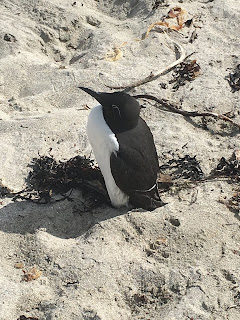Here is a piece I wrote back in July 2003 when Martina Navratiliova
won her 20th Wimbledon title with victory in the mixed doubles. It seems I was reading
Barbara Kingsolver's High Tide in Tucson at the time, hence the apology, although I can't remember now if it refers to a particular essay in that brilliant collection. It seems appropriate to post this during Wimbledon fortnight and to celebrate the US decision to legalise same sex marriage. Now if they could only bring back serve and volley lawn tennis...
CENTRE COURT
(with apologies to Barbara Kingsolver)
I’m sitting in my friend
Anne’s living-room, wearing my favourite faded black denim jeans and shiny new
tan Cowboy boots. To fully admire these my feet are up on Anne’s glass-topped
coffee-table. We are scoffing peanuts, swigging back Molson beer and watching
the game on TV.
But the game is not the World
Series or even the Superbowl, although no doubt many otherwise well-adjusted
mid-life women could justifiably spend their time on either. The game we are
giving up our Sunday afternoon for is being beamed by satellite over five or
six thousand miles, from the sedate manicured grass lawns of the All England
Croquet and Lawn Tennis Club in Wimbledon, UK.
None but diehard fans of this
august institution set amid leafy London suburbs now recalls that tennis was
once the Young Turk, invading the sacred lawns of SW19 with gut-strung rackets
swinging fiercely against the cylinder-shaped wooden croquet clubs known as
mallets. These days Wimbledon is internationally famous, one of the four Grand
Slam tournaments that all tennis players dream of winning but few attain. The
only one, now, that is played on grass, where the skills and tactics of
serve-and-volley are barely mastered by modern players. But still they come,
Young Turks and old, to try their hand on grass that has surely been cut with
nail scissors.
On court is Martina
Navratilova, definitely an old Turk. Nine times Ladies’ Singles Champion and
holder of ten further titles in doubles and mixed doubles. Her partner, a
smiling, round-faced Indian man called Leander Paes, was born the first year
that Navratilova played at Wimbledon, in 1973. Then she was a mousy-haired, sixteen-year-old
chubby Czech. Five years later when she won Wimbledon for the first time, beating
super-cool, elegant Chrissie Evert in a three-set thriller, she was stateless,
a defector, her parents huddling round a TV set near the East German border to
watch their daughter’s triumph. Now the Berlin Wall is a distant memory and Navratilova
is one of us, a US citizen, lithe, lean and lissom with tinted blonde locks. In
crisp shorts her presence on the court is eager and efficient, like a well-bred
greyhound, her competitive instincts undimmed. She wears her forty-six years
lightly, like a plastic raincoat that can be discarded when the sun shines. Martina
Hingis, the tennis champion who was named after her, has recently retired, aged
twenty-two. Her two opponents today, Rodionova and Ram, Russian and Israeli
respectively, are both more than half her age.
It is evening sunlight on
Centre Court, midday in Tucson. As Anne and I settle in there is no sign that
the crowd are about to drift away to car or Underground Station, even though
the media-dubbed ‘business end’ of the tournament, the Men’s Singles Final,
finished nearly three hours ago. They know, as we do, that a piece of history
is about to unfold, served up by a middle-aged woman with a pink triangle in
her racket.
In 1979 it was Navratilova
who helped her then doubles partner, Billie-Jean King, to win her record-breaking
twentieth Wimbledon title. The previous record-holder, Elizabeth Ryan, had
prophetically died the night before. We fervently hope Billie-Jean, on the
verge of her sixtieth birthday, won’t do the same as Martina lobs and volleys
her way to equalling that record.
They are our heroes; two sporting
women who have surpassed all expectations of our sex, pioneers of fitness, diet
and dedication. But above all they have been true to themselves. Living their
personal relationships in the spotlight of public attention and judgment they
have let their tennis speak, not their lesbianism. Whatever that is. Women who
love women, and life, and tennis.
Two sets, two more beers. As
the sun descends over South-East England, Anne and I stand and cheer, raising
our glasses to a legend, a modern goddess achieving her dream.




